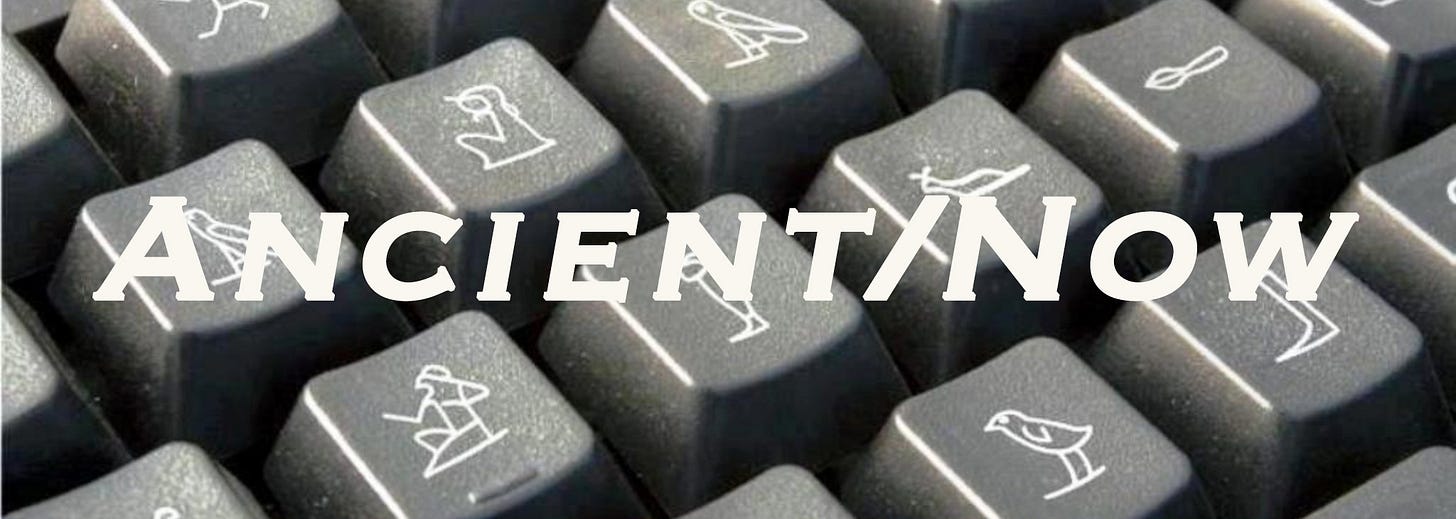Ancient/Now - September 20th
Men's obsession with ancient Rome, the risks of being a diplomatic messenger to ancient Egypt, the continued fall-out from the British Museum scandal, and more
Why are men so obsessed with ancient Rome?

How often to men think about ancient Rome? Quite a lot, it turns out—much to the surprise of many women. A TikTok trend of women asking men if they think about ancient Rome recently prompted the likes of The Washington Post and Rolling Stone to publish articles on the question of why so many men say that they often think about ancient Rome. (The trend also inspired brilliant responses like this one called, “Female equivalents to the Roman Empire,” which is just hilarious…) We might blame a Western bias for the way ancient history is positivistically taught in this country, with a heavy emphasis on the Roman Empire. Or there’s the film Gladiator with Russel Crowe being all manly and shit, giving us a glimpse into the popularity of ancient Rome in media and pop culture. And Stoicism has made a comeback with the dudes in a big way with bestselling authors like Ryan Holiday whose books look to ancient Roman emperors like Marcus Aurelius and Classical philosophy to provide readers with a road map to personal and professional success. And of course, ancient Rome played a significant role in the course of Western history; a mythological America has inherited the positive spin of ancient Rome’s legacy—good men with Strength and Honor making a go of it in a brutal world. American men are still obsessed—with Roman might, cleverness, wealth, longevity and all around imperial masculinity. Russel Crowe, as general Maximus Decimus Meridius in Gladiator, demanded, “Are you not entertained!?” The answer for many men, apparently, is so much.
Some American men say they think about ancient Rome once a week, daily, or even “once every seven hours,” meaning there is more to this than fascination and fantasy. This is about emperors with absolute power, war, violence, sex, literal world domination. Ancient Roman history is nothing less than a patriarchal wet dream.
“So yeah,” History of Rome podcast Mike Duncan tells the hyper-masculine rag Rolling Stone, “the Roman Empire choo choo train comes around, usually more than once per day.” (For more on the toxic masculinity and Rolling Stone, check out this story, btw…) While the patriarchal appeal of ancient Rome is obvious, perhaps there is another element to it, something men used to have and are searching for in the mythical past, because modern men seem to be looking to ancient Rome for something they are missing in their own lives. Patriarchy fails everyone.
A harsh life? Egypt’s Late Bronze Age diplomatic messengers

We know quite a lot about Egypt’s international relations during the Late Bronze Age thanks to the survival of various archives of ancient diplomatic correspondence like the so-called “Amarna Letters.” (Stay tuned for our upcoming podcast episode on this topic!) The letters, carried by diplomatic messengers, were written onto baked clay tablets covered in the angular cuneiform script of Akkadian (or more specifically Canaanite-Akkadian) that constituted the lingua franca of ancient Egypt and West Asia. They read like an ancient Craig’s List for rulers of Egypt, Mesopotamia, and the Levant, complete with effusive compliments, pointed commentary, and indignant complaints about each other. Within these letters Bronze Age kings and kinglets made trade agreements, political alliances, and arranged the exchange of commodities like luxury goods and women, among other things. While the exchange of this correspondence was key to fostering and maintaining relations between rulers, the letters reveal that the life of the diplomatic messengers who carried them could be harsh and full of risk—especially if you were part of a diplomatic envoy sent to Egypt. Mohy-Eldin E. Abo-Eleaz, Associate Professor History and Civilization of Egypt and the Ancient Near East at Minia University, writes,
These official messengers had to withstand numerous dangers and difficulties to accomplish their missions, such as the possibility of encountering bad roads, robberies, and assaults. But the risks didn’t end there: correspondence between the kings of Egypt and various rulers across the Near East suggests that royal messengers were subject to harsh treatment especially in the Egyptian court, raising questions as to whether the Egyptian king was violating diplomatic norms—the envoys’ “diplomatic immunity,” so to speak.
For instance, Tushratta, the Mitannian king, sent envoys to the court of Amenhotep III who were detained so long that the king had to write letters asking that they be sent home. Some of the letters suggest the envoys were accused of a crime of some kind; perhaps they knew/did something they shouldn’t have. The envoys didn’t get sent back home until the reign of Amenhotep III’s son, Akhenaten. In short, being detained overseas is a bitch, and the correspondence clarifies that envoys to Egypt could be neglected, humiliated, detained, and ill-treated by Egypt’s kings. Reading some of the current headlines in the news, it sounds like we are quickly returning to such times.
NYT: What the scandal at the British Museum reveals

Last weekend Jason Felch, co-author of Chasing Aphrodite: The Hunt for Looted Antiquities at the World’s Richest Museum, published an opinion piece in The New York Times about the recent British Museum scandal, in which thousands of artifacts from the museum were stolen by a curator and peddled on eBay. Encyclopedic (or universal) museums like the British Museum, Felch points out, are almost exclusively found in countries with histories of colonialism—because where else would they get all that stuff from all those different places on the globe. These encyclopedic museums should be acknowledged as remnants of these countries’ colonialist pasts, Felch argues, and we need to “radically reimagine the mission and purpose of the universal museum…and what they owe to the world.” Felch writes:
The British Museum must use this scandal as an opportunity to update the dusty notion of the so-called universal museum — rethinking how these institutions can exist in a 21st-century world where the sharing and blending of cultures has never been more crucial. Rather than resisting calls to repatriate contested objects in their collections, museums should be transparent about their holdings and how they were acquired. They should embark on a campaign of generous, long-term loans that allows objects to circulate freely across borders. And they should embrace digital tools to open their storage facilities to public scrutiny.
Felch’s suggestion of “generous, long-term loans that allows objects to circulate freely across borders” and using digital tools to increase public access to museum collections (see Amber’s post on the pitfalls and promises of virtual exhibitions for more for more on this topic) are great ideas, but it remains to be seen how much goodwill and trust can be built between countries with colonialist roots and those that they once subjugated.
What else were we reading this week?
Wooden ceiling installed in Karnak Temple draws criticism
Restoration in the Valley of the Kings
Grand Egyptian Museum to be inaugurated by the end of 2023: Official
Signs of the Zodiac: The Dendera Dating Controversy
With 2,000 missing objects, the British Museum faces historic crisis of custodianship, but this case is far from unique
NYT: Manhattan Prosecutors Seize a Bronze Bust Valued at $5 Million
Archaeologists uncover 3,000-year-old ancient weavings in Alaska
“Sin”: The Hidden History
Archaeological Tropes That Perpetuate Colonialism
NYT: Undying Dread: A 400-Year-Old Corpse, Locked to Its Grave
One more thing…
Kara recently joined Dr. Bob Cargill, Associate Professor of Biblical Studies at the University of Iowa, on the Tower of Bible podcast for a provocative conversation about women, power, politics, and death in ancient Egypt. Check it out!






